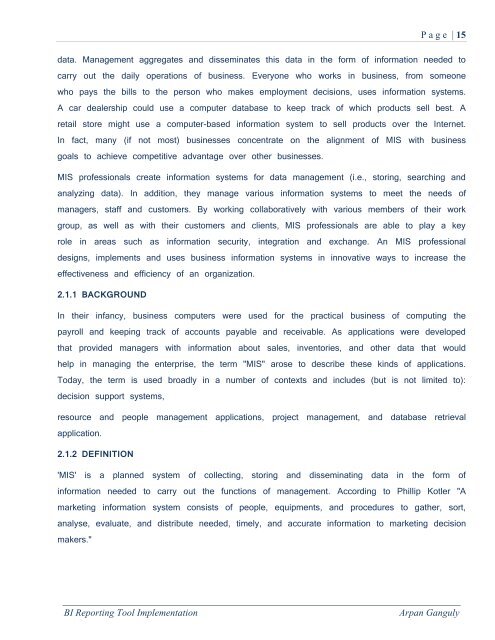Implementation
You also want an ePaper? Increase the reach of your titles
YUMPU automatically turns print PDFs into web optimized ePapers that Google loves.
P a g e | 15<br />
data. Management aggregates and disseminates this data in the form of information needed to<br />
carry out the daily operations of business. Everyone who works in business, from someone<br />
who pays the bills to the person who makes employment decisions, uses information systems.<br />
A car dealership could use a computer database to keep track of which products sell best. A<br />
retail store might use a computer-based information system to sell products over the Internet.<br />
In fact, many (if not most) businesses concentrate on the alignment of MIS with business<br />
goals to achieve competitive advantage over other businesses.<br />
MIS professionals create information systems for data management (i.e., storing, searching and<br />
analyzing data). In addition, they manage various information systems to meet the needs of<br />
managers, staff and customers. By working collaboratively with various members of their work<br />
group, as well as with their customers and clients, MIS professionals are able to play a key<br />
role in areas such as information security, integration and exchange. An MIS professional<br />
designs, implements and uses business information systems in innovative ways to increase the<br />
effectiveness and efficiency of an organization.<br />
2.1.1 BACKGROUND<br />
In their infancy, business computers were used for the practical business of computing the<br />
payroll and keeping track of accounts payable and receivable. As applications were developed<br />
that provided managers with information about sales, inventories, and other data that would<br />
help in managing the enterprise, the term "MIS" arose to describe these kinds of applications.<br />
Today, the term is used broadly in a number of contexts and includes (but is not limited to):<br />
decision support systems,<br />
resource and people management applications, project management, and database retrieval<br />
application.<br />
2.1.2 DEFINITION<br />
'MIS' is a planned system of collecting, storing and disseminating data in the form of<br />
information needed to carry out the functions of management. According to Phillip Kotler "A<br />
marketing information system consists of people, equipments, and procedures to gather, sort,<br />
analyse, evaluate, and distribute needed, timely, and accurate information to marketing decision<br />
makers."<br />
__________________________________________________________________________________<br />
BI Reporting Tool <strong>Implementation</strong> Arpan Ganguly



